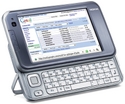ARM, x86 duel in MID warfare
Dec 19, 2008 — by Eric Brown — from the LinuxDevices Archive — 1 views The market for MIDs, netbooks, and other devices that straddle the notebook and smartphone formats will turn into a battleground between X86 and ARM architectures, says ABI Research. The competition will come down to ARM's power-saving advantage vs. the X86 edge in software compatibility, says ABI.
The market for MIDs, netbooks, and other devices that straddle the notebook and smartphone formats will turn into a battleground between X86 and ARM architectures, says ABI Research. The competition will come down to ARM's power-saving advantage vs. the X86 edge in software compatibility, says ABI.
The ABI analysis on processors is part of its larger study of UMDs (ultra-mobile devices), which it defines as covering netbooks, ultra-mobile PCs, and mobile Internet devices (MIDs), such as BenQ's Intel Atom-based S6 MID (pictured above). The processor rivalry is “playing a pivotal role in how this market is shaping up,” says the study, which notes that X86-based processors from Intel are well entrenched in the PC world, while ARM-based processors lead the way in handsets.
As mobile converged devices sit in between, they will soon be the locus of intensified rivalry between the platforms. In fact, says ABI, Intel and ARM Ltd. are “already fighting it out, starting with marketing wars.”
Converging toward a MID ground
Thanks to Intel's push behind MIDs and netbooks, which both primarily run the Intel Atom processor, the X86 camp appears to have the early lead. However, ARM is likely to eclipse Intel in MIDs, says ABI. “X86-based processor vendors are in a very good position in the near term as far as product wins and market share are concerned,” stated ABI Research principal analyst Philip Solis. “However, as MIDs start to surpass netbooks in shipment volumes, ARM-based solutions will be in a better position.”
 The MID-like Archos 5 PMP is based on TI's ARM Cortex-A8-based OMAP3x (Click for details) |
The superior software compatibility of X86 processors from Intel and Via is not likely to change soon, but unlike the netbook category, full software compatibility may not be as big of an issue on handheld MIDs. The bigger question is whether processors such as the Atom, and Intel's next-generation mobile processor, code-named Moorestown, can keep up with ARM on power management. “For devices such as MIDs, that may be used very heavily all day or may need to last for days without recharging, ARM-based processors hold the advantage,” says ABI.
While the study mentions Via Technologies as holding up the X86 fort along with Intel, it does not make any predictions regarding the potential success of Via's Nano processor in the category. In tech-publication benchmarks comparing the Nano with the Atom, the Nano outperformed the Atom, but used more power under full load, suggesting that Nano, with its out-of-order pipeline, may be better suited to nettops.
As Intel and Via continue to tune power management, ARM is working with software vendors to improve compatibility, says the research group. “The future shape of this market will be determined by engineering success on the x86 side versus business success on the ARM side,” concluded Solis.
 Big ARM MID on the block: Nokia's N810 Internet Tablet |
In ABI's first report based on its UMD research, focusing on MIDs, ABI forecast that by 2013, MIDs will outsell netbooks, and that Linux will take the “lion's share” of the market, selling 86 million devices that year. The Linux MID segment will primarily be limited to three platforms, said ABI, with the Intel-sponsored Moblin. leading with 42 percent. Next in line, the group projected, will come Maemo, which runs on Nokia's Internet Tablets, including the N810 (pictured). The N810 uses an ARM-based Texas Instruments (TI) OMAP 2420, and next year Nokia will release a new Maemo-5-based tablet that runs on TI's more powerful ARM Cortex-A8-based OMAP3x processor. The LiMo Foundation's mobile-phone oriented LiMo Platform, was pegged as coming in third in MID software.
Availability
More information on the ABI Research UMD study should be here.
This article was originally published on LinuxDevices.com and has been donated to the open source community by QuinStreet Inc. Please visit LinuxToday.com for up-to-date news and articles about Linux and open source.